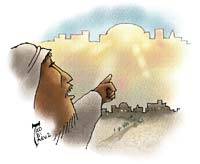Begin Again
A time of crisis is a time of opportunity for change, for newness, for fresh beginnings. When all is well, there is little reason to want a change. When our world is shattered, however, we hearken to those who can help us find a way forward toward a new state of well-being. So it was with the exiles to whom Isaiah prophesied in today’s first reading. Hope of a new beginning dawns as the prophet is instructed to “speak tenderly to Jerusalem”—literally, “speak to Jerusalem’s heart.” This is the language of lovers. The comforting news is that the time of enslavement to Babylon is at last ended. A way is forged through the desert back home to Jerusalem.
Some of the exiles considered their suffering to be a punishment for their sins. The prophet, however, speaks of the “strong arm” of the Holy One not as one that punishes, but as one that has strength to gather up all the lambs, to hold them close to God’s breast, gently leading them home. This is the glad tidings: that God’s power is that of a tender shepherd, holding close all those who feel broken and vulnerable, leading them out of their desert places and guiding them along God’s “way.”
The new beginning John the Baptist announces has everyone abuzz. The free gift of forgiveness awaits any who acknowledge their sins and let God’s grace wash over them. This fresh start is brought to completion by the one coming after John, who will baptize with the Holy Spirit. The opening verse of the Gospel, “the beginning of the good news,” reprises the first line of Genesis. Mark raises our expectations that God is doing something new with the coming of Jesus—a new creation that begins again in our own day, every time we turn to God and let our hearts be moved to follow the “straight way.”
The second reading speaks of the newness for which we long in terms of “new heavens and a new earth.” Other biblical authors speak of such a new creation (Is 65:17; 66:22; Rev 21:1; 2 Cor 5:17; Gal 6:15), but only in 2 Peter does the writer envision a fiery consummation and destruction of the whole of creation before the coming of the new. Such a notion originated in Persia, then spread to the Greco-Roman world. There are times when we too may find ourselves wishing that God would do something dramatic to start over again. The good news of the Gospel is that God has done something dramatic and continues to make dramatic transformations, not with fiery conflagration, but with every hardened heart that lets itself be held to God’s bosom and washed in Jesus’ purifying love. It is by such ordinary yet extraordinary means that Holy Wisdom incarnate transforms our world and our hearts.
For some, it can take a very long time to open up to God’s love. For others it happens in a twinkling. It is not God’s promise of newness that is delayed, but we who sometimes dawdle. Today’s second reading assures us that God is patient and does not use the same timetables we do. In the divine reality “one day is like a thousand years and a thousand years like a day.” The delay, says 2 Peter, is so that all have time to accept the transforming love of God that enables them to reshape their lives.
In today’s readings there is a dual dynamic: it is God who brings about the new beginnings, but this cannot happen without human response. We must acknowledge and let go all that stands in the way of our openness to God’s coming. The first and second readings invite us into the desert to do this. Desert space is always ambivalent: it is both a place of terror and emptiness and, at the same time, a hollowed-out space of grace. From the desert comes a voice of hope, bringing the good news that God’s love never wavers; but when we fall short, with God’s grace we can always begin again.
Two other important feasts this week celebrate God’s extraordinary grace in the person of Mary, who is acclaimed as patroness of the Americas under two titles: the Immaculate Conception (Dec. 8) and Our Lady of Guadalupe (Dec. 12). The first was established as a universal feast of the church by Pope Sixtus IV in 1476. Then in 1854, Pope Pius IX defined as dogma that Mary was free from all sin from the moment of her conception. The second commemorates the appearances of Mary to Juan Diego on the hill of Tepeyac near Mexico City in 1531. There she took the form of an indigenous woman, pregnant with hope and the promise of God’s special concern for the most downtrodden. God’s maternal care for us is palpably present in these graced symbols.
This article also appeared in print, under the headline “Begin Again,” in the December 1, 2008, issue.








